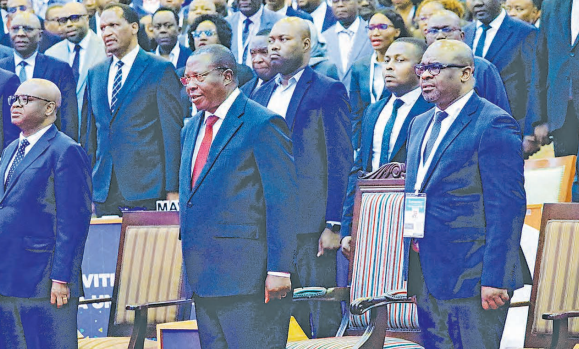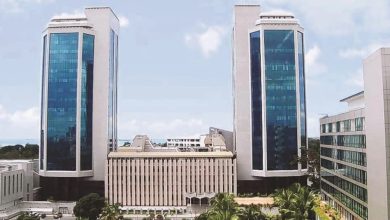Key issues emerge in the CEOs Forum 2025 as Tanzania pushes for public sector reform

ARUSHA: INSIDE the iconic Simba Hall at the Arusha International Conference Centre (AICC), on August 23, 2025, the mood was both serious and ambitious.
The Chairpersons and CEOs Forum 2025, which gathered over 650 senior executives from more than 300 public institutions, felt less like a corporate meeting and more like a strategic national briefing.
The forum unpacked a series of interlinked issues, exposing both the strengths and limitations of Tanzania’s public sector, while mapping a future defined by regional integration, digital reform, governance and performance accountability.
The tone was set early by Vice – President Dr Philip Mpango, who, speaking from the main plenary stage, wasted no time in pushing for a radical shift in the way Tanzania’s public institutions think and act.
“To thrive in a global economy, we must think beyond our borders,” Dr Mpango declared. “Public entities must not just serve local needs. They must become ambassadors of Tanzanian excellence across Africa and the world.”
It was a clear challenge — and a call to action. For four days, with breakout sessions held at venues like PAPU Tower, Gran Meliá Arusha and Mount Meru Hotel, the forum continued to explore these critical themes.
The pressure to expand, the demand to perform
At the heart of Dr Mpango’s keynote was a strategic pivot: Tanzania’s public corporations, once focused primarily on domestic service delivery, are now expected to venture into regional markets and actively seek crossborder partnerships and foreign investment.
This is no small task. But the logic is clear — for Tanzania to compete in the global marketplace, its institutions must become drivers of international business, not just custodians of national resources.
Yet, that ambition comes with a burden.
Dr Mpango reminded his audience that 86tri/- in government investments are tied up in public enterprises — and Tanzanians are still waiting for visible returns.
“Reforms are not optional,” he said firmly. “They are a responsibility. These institutions must deliver value, stimulate innovation, create jobs and boost revenue.” From reliance to revenue:
The subsidy question
A theme echoed across speeches and panel discussions was the urgency of moving public entities from dependence to selfsufficiency.
It is a message that has been consistently driven by President Dr Samia Suluhu Hassan, and it took centre stage at the forum.
Deputy Prime Minister Dr Doto Biteko, delivering the closing remarks, emphasised this point with urgency.
“Tanzanians depend on you to transform their lives,” he said. “With such massive government investment, every institution has a debt — not just financial, but moral — to deliver real change.”
Citing success stories like the Tanzania Petroleum Development Corporation (TPDC), which doubled its contribution to the Government Consolidated Fund within a year, and the National Housing Corporation (NHC), which recorded a staggering 363 per cent increase in revenue contribution, Dr Biteko showed that reform is not only possible — it’s already happening.
Still, he stressed, many institutions are lagging behind. The message from the top was clear: underperformance will no longer be tolerated. Every board chair and CEO will be held accountable.
Governance under the microscope
Across the forum, speakers returned to the issue of governance — the foundation upon which reform, innovation and growth must be built.
Mr Nehemia Mchechu, the Treasury Registrar, presented a comprehensive update on the state of public investments.
According to him, the value of government assets in public institutions had risen by 82 per cent, from 65 tri/- in 2020 to 86 tri/- in 2025 — a growth largely driven by strategic sectors like energy and infrastructure.
But Mr Mchechu did not dwell only on figures. Instead, he zeroed in on what needed to change: financial discipline, procurement integrity, human resource reform and smarter contract management.
The digital divide: Untapped potential in SOEs
Another urgent issue that surfaced was digital and financial inclusion — or more precisely, the lack thereof.
Kennedy Komba, Director of Financial Deepening and Inclusion at the Bank of Tanzania, pulled no punches in his analysis. While mobile money usage is widespread, formal financial inclusion remains low — with only 24 per cent of Tanzanian adults holding bank accounts.
More troubling, a significant percentage of Tanzanians — 30 per cent of women and 40 per cent of men — do not have SIM cards registered in their names, limiting access to digital services.
Mr Komba pointed to State Owned Enterprises (SOEs) as uniquely positioned to lead the digital transformation.
“With their reach in transport, energy and telecoms, public corporations must spearhead digital public infrastructure,” he argued.
He added: “We need universal digital IDs, seamless payment systems and digital salaries. It’s not just about access — it’s about usability and trust.”
He called for a people-centric approach and public-private partnerships, alongside national digital literacy campaigns.
Cutting bureaucracy, cultivating agility
Corporate leaders like Ms Fatma Abdallah, CEO of Puma Energy Tanzania, took a more introspective approach, urging her peers to confront the internal obstacles that often cripple innovation.
Bureaucracy, she argued, is not inherently bad — but unchecked, it becomes a brake on efficiency.
Ms Abdallah proposed a five-pillar transformation model, built on agile leadership, governance reform, workforce empowerment, digital tools and ESG accountability.
“We must become more agile, more responsive and more focused on outcomes,” she said. “We can’t compete globally if we’re stuck in outdated processes.”
Her remarks drew applause and echoed a growing sentiment: that reform must begin within.
Africa’s credit autonomy and Tanzania’s role
The forum also ventured into continental finance, with Ambassador Marie-Antoinette Rose-Quatre from the African Peer Review Mechanism (APRM) introducing the forthcoming African Credit Rating Agency (AfCRA) — a homegrown alternative to Western agencies like Moody’s and Fitch.
“African economies are often misjudged through foreign lenses,” she said.
“AfCRA will give us a fairer, more contextual assessment.” She praised Tanzania’s SOE reforms, describing the country as a strategic trade hub with the potential to produce regional champions under the AfCFTA framework.
Her recommendation to Tanzanian institutions: explore alternative financing — from regional bond markets to subsidiary listings — and use strong governance as a springboard for long-term financial autonomy.
Awards, accountability and a path forward
From the very outset, performance was placed at the centre of the conversation — a tone set during the opening day’s recognition ceremony.
Institutions that had demonstrated tangible improvements — in governance, revenue, innovation, or service delivery — were awarded in a formal ceremony led by the Office of the Treasury Registrar.
In the commercial institutions category, recognised for revenue and profitability growth, the top three were the National Housing Corporation (NHC), Tanzania Petroleum Development Corporation (TPDC) and State Mining Corporation (STAMICO).
For non-commercial institutions, which were judged on efficiency and reduced subsidy reliance, the winners included the Tanzania Forest Services (TFS), the Tanzania Tobacco Board (TTB) and the National Bureau of Statistics (NBS).
In the category combining commercial and regulatory mandates, honours went to the Bank of Tanzania (BOT), the Tanzania Medicines and Medical Devices Authority (TMDA) and the Tanzania Mercantile Exchange (TMX) for demonstrating strong governance and transparency.
For public service delivery excellence, where digital transformation and customer satisfaction were key criteria, the recognised institutions were the Jakaya Kikwete Cardiac Institute (JKCI), the Warehouse Receipt Regulatory Board (WRRB) and the Land Transport Regulatory Authority (LATRA).
These recognitions were more than accolades; they were a message — that excellence is possible, that accountability is real and that transformation is already underway.
But the celebrations were grounded in a broader purpose: to inspire others, to raise the bar and to signal that accountability is here to stay.
Final thoughts: A sector at the crossroads
The CEOs Forum 2025 did more than hosting speeches and handing over awards.
It laid bare the key tensions defining Tanzania’s development: ambition versus capacity, innovation versus inertia and independence versus dependency.
As the country positions itself for regional leadership and continental integration, the forum revealed that public institutions are both the engine and the test case.
Whether they rise to the challenge will determine much more than quarterly revenue — it will shape the future of Tanzania’s economy, governance and place in the world.
As Planning and Investment Deputy Minister, Mr Stanslaus Nyongo, reminded the gathering, Tanzania’s ambition to become a $1 trillion economy by 2050 will depend not just on big ideas, but on strong, disciplined institutions that can execute them.
And as Dr Mpango had emphasised from the start, “Strong governance of public institutions is not just about financial returns. It’s about service. It’s about jobs. It’s about trust.”






buy vicodin online
Всем Шалом музыканты!
Ищете где скачать музыку бесплатно? Хочу поделится с вами классным сайтом в для прослушивания и скачивания песен в мп3 бесплатно и без регистрации. Данный сайт очень простой, удобный, быстрый. Не требует регистрации и прочего. Вот ссылка на него https://muz.xyz/.
The Herz P1 Smart biometric data ring
is a cutting-edge wearable device that has been making waves in the health and fitness industry.
Claim up to 600,000 NGN with promo code UBASO at 1xBet!
Start with just 1700 NGN. 30-day bonus validity.
Cardio Genix, a leading health
and wellness company, has recently launched its official site, promising
to revolutionize the health industry.